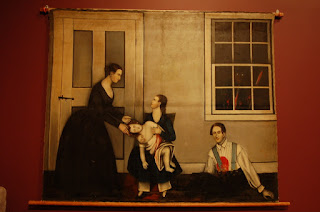THE FOOT POWDER COURT
“Unlike most negro convicts, he [William Freeman] never became in any degree reconciled to his condition. He repeatedly asserted his innocence to the constables, justice, and jailer, before, and to the keepers of the prison after his conviction, and vainly urged his release.”- Dr. Bigelow The Report of the Trial of William Freeman
WH Seward addressed the court:
“The prisoner [Henry Wyatt] is accused of murder. The law says, keep away, hold out no fear or hope. You have heard that for seeking his liberty he was scourged 15, 30, 60, 90; more stripes than a fellow convict had the feeling to count. He has been treated as he ought for his crime; but it is too great a power, that the instruments of the law should pursue and persecute…….The expression here was calculated to produce fear.”
William Freeman didn’t go to the courthouse that last day for the closing arguments in the Wyatt trial. He’d given up trying to hear what was being said in court. Why nobody mentioned his unfair treatment and the widow’s horse was beyond his comprehension. Instead of going to the courthouse Bill went over to the blacksmith shop to see about getting something made. Like C. W. Hardenbergh, Bill Freeman would take the “law” into his own hands.
I am confident, that on any particular day in February 1846, in the Court of Oyer and Terminer, Cayuga County, Auburn, New York, William Freeman, Henry Wyatt and Hon. William H Seward all sat in the same room at the same time. Wyatt knew Freeman by sight and William Freeman knew Henry Wyatt from prison. Seward did not know Freeman at this time, but would soon become well acquainted with the deaf young man.
Back in his cell at The State Prison, Austin Reed once again asked for paper and quill—and was refused. His memoir remained unwritten (in his head) percolating. He had returned to Auburn Prison, after another short stint on the outside and by this time was an old hand at doing time. From prison records we know that on February 15, 1843 Austin Reed was sent to the dungeon on bread and water “for obtaining ivory from the cutlery shop under false pretenses.” For Austin Reed, the punishments would continue.
As time passed the clergy would shift their emphasis from reformation of the inmate to adopt a more “cautionary tale,” approach aimed at the youth on the outside; hopingto catch them before they endured incarceration. Religious tract societies flourished, and books like Black Jacob found a wide readership. The message was a simple one—prison was to be avoided at all costs. The concept of a “hell on earth,” a “furnace of affliction,” that Rev. John Stanford had preached at Newgate, where the inmate suffered, hopefully reborn in repentance, persisted on the outside. On the inside it was all about survival.
Now the prison chaplaincy barely raised an eyebrow at the keepers’ abuses. When Henry Seward left office his progressive reforms were immediately reversed by the next administration. The worst of the prison agents, Elam Lynds, was immediately reinstated at Sing-Sing. Ex-inmate prison narratives and annual reports all agreed—if you survived your stint upstate, you came out a changed man—most times not for the better. And what better witness than the keeper himself?
“The dungeon is but slightly lighted.” Captain U.F. Doubleday testified, “Have understood that a ventilator goes up through. There is a grated door. The grates open. Don’t recollect that on the fourth day that Wyatt was taken out on account of a pestilential atmosphere there. Probably the dungeon was cleaned out. Think it probable. I recollect going to Wyatt’s cell before the death of Gordon and asked him from where he had known Head another convict. I received a letter from Ohio giving account of a murder committed, which from the circumstances there, led me to conclude that Wyatt and Head had been concerned in those murders. I think the chaplain and clerk were acquainted with the contents of that letter. Am not sure I said that Wyatt was a stage driver in a show.”
William H. Seward and his legal team of Christopher Morgan and Samuel Blatchford rested their case and it went to the jury. To everyone’s amazement Henry Wyatt (the proxy for the mentally ill) was not convicted; but got a hung jury. One farmer would not budge. This was a giant victory for both Seward’s law firm and Henry Wyatt. Nobody in Auburn could believe it. The townsfolk all felt if anybody was a premeditated cold-blooded killer, deserving of execution, it was Henry Wyatt. The backlash was swift. How could the average citizen feel safe in their homes if a murderer could just plead “insanity,” and escape the gallows? Auburn and the local press were in an uproar. It seemed to many an obvious miscarriage of justice. Like the British were fond of saying when an argument arose, “I can decide this in the time between the stamp of my foot and the settling dust.”

Comments
Post a Comment